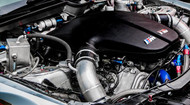What Does the Water Pump Do and Why Is It Important?
28th Apr 2022

A water pump is a vital part of a vehicle. Unless your vehicle has an air-cooled engine, which are quite rare, it's probably equipped with a water pump. Nearly all liquid-cooled engines require a water pump. What does a water pump do exactly, and why is it important?
What Is a Water Pump?
A water pump is a mechanical device that's responsible for pumping coolant so that it can circulate through your vehicle's cooling system. They don't actually pump water. Most vehicles use coolant in their respective cooling system, and water pumps are designed to pump this coolant. Coolant typically consists of a mixture of distilled water and antifreeze.
How Water Pumps Works
While there are different types of water pumps, most of them are belt driven. They are powered by either a timing belt or serpentine belt. After cranking your vehicle, one of these two belts will begin to spin while subsequently powering the water pump. As the appropriate belt spins, the water pump will pull coolant from your vehicle's radiator so that it can circulate through the rest of your vehicle's cooling system.
Water pumps simply work by pulling coolant from the radiator and moving it through the rest of the cooling system. They prevent coolant from becoming stagnant or stuck in the radiator. Once the timing belt or serpentine belt begins to spin, the water pump will pull coolant from the radiator, thus keeping engine temperatures in check.
The Importance of a Water Pump
You can't ignore a broken or dysfunctional water pump. If it fails, your vehicle's engine may overheat. The water pump is an essential part of your vehicle's cooling system. It works in conjunction with coolant, hoses and a thermostat to regulate the temperature of your vehicle's engine.
If the water pump fails, coolant won't be able to circulate through your vehicle's cooling system. There may still be coolant in the engine, as well as the radiator, but it will remain stagnant. As a result, the temperature of the coolant will increase, which may lead to your vehicle's engine overheating.
Coolant must be able to circulate through your vehicle's cooling system so that it can remove heat and regulate the temperature of your vehicle's engine. As it circulates, it will release heat at the radiator. A failed water pump means that coolant won't be able to circulate. Instead, it will remain stagnant, which can place your vehicle's engine at risk of overheating.

